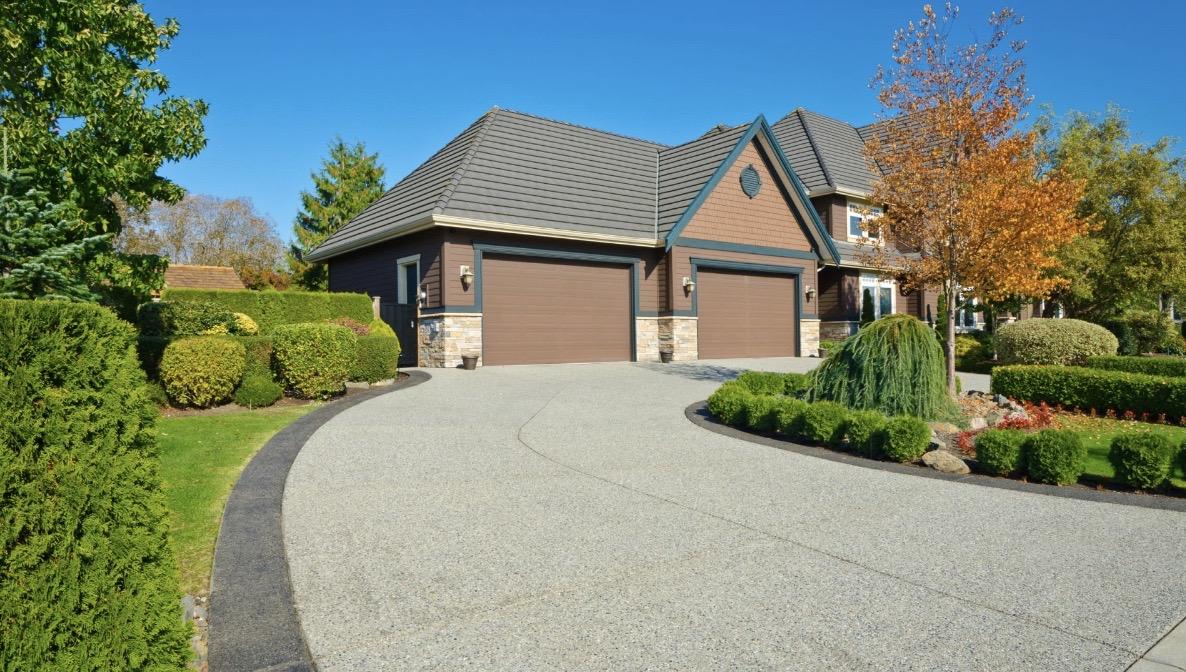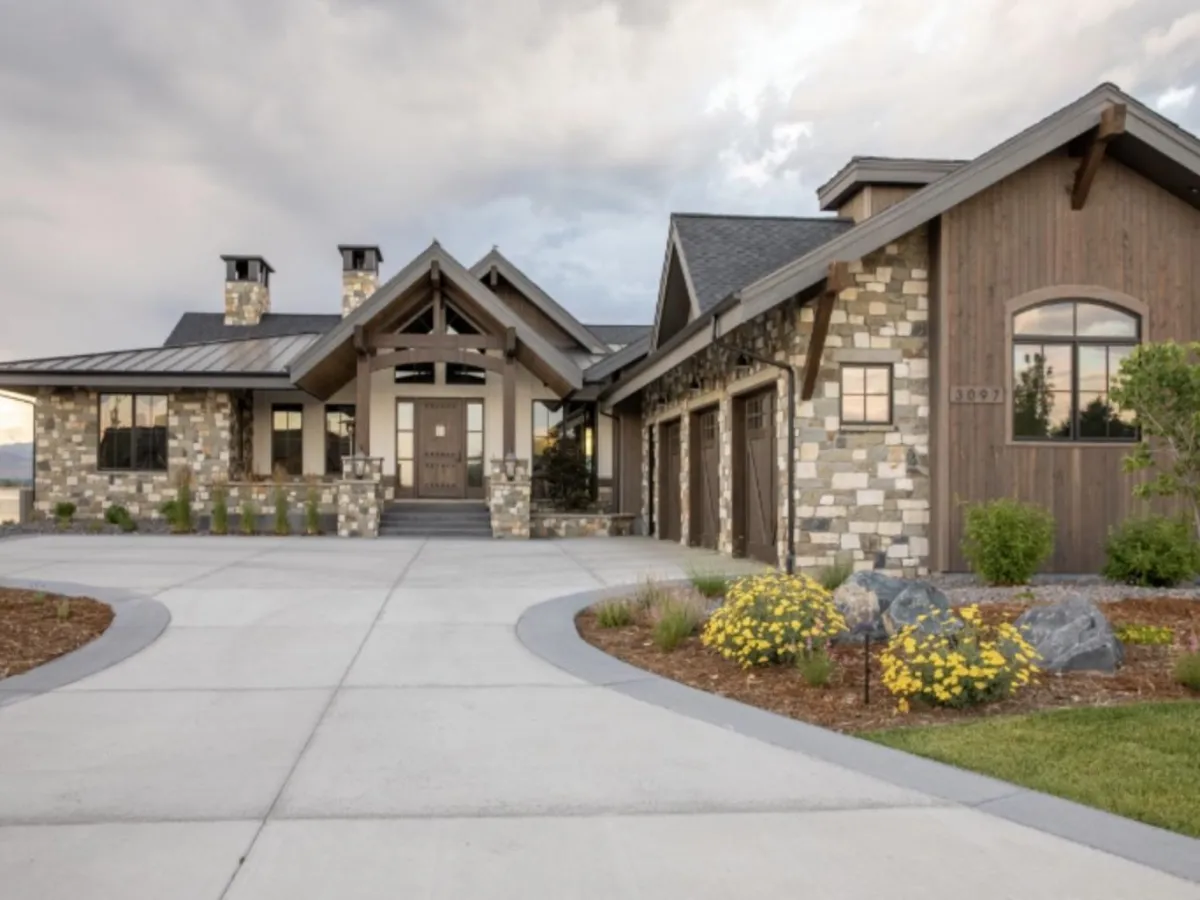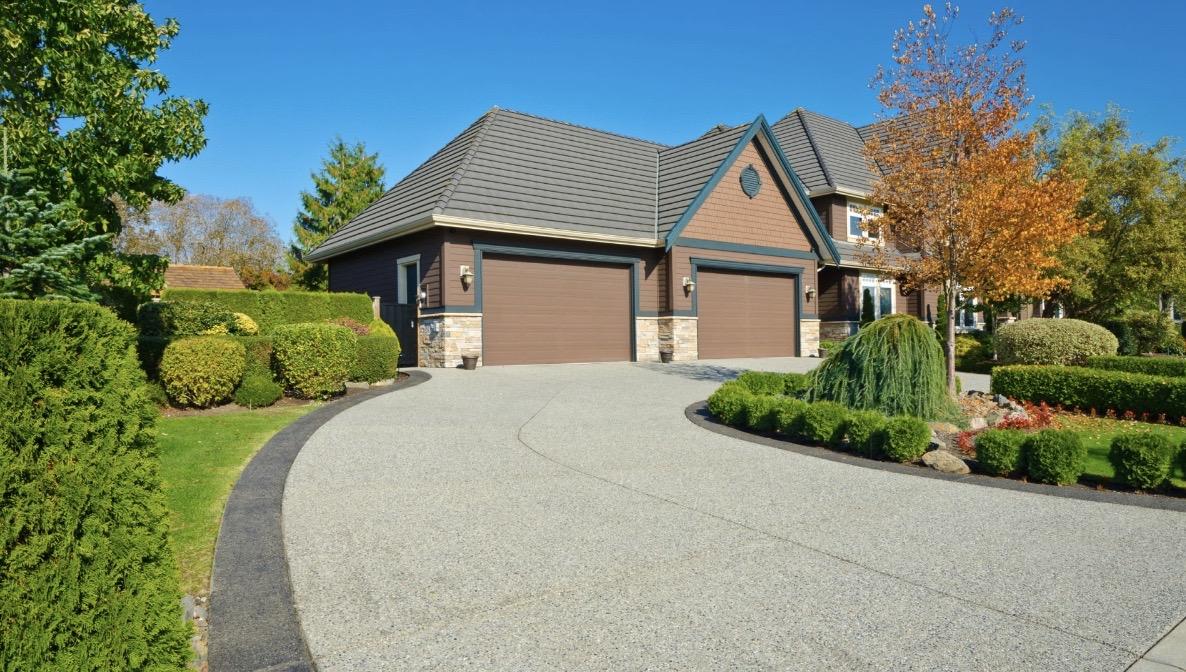Blog > Concrete Creations & Excavations Articles
Concrete Creations & Excavations Article Library
Welcome to the Concrete Creations & Excavations Blog Article Library, a valuable resource designed to connect homeowners like you with the world of concrete craftsmanship and innovation. Our blog serves as a hub for those seeking inspiration and information about the remarkable potential of concrete in transforming your living spaces. Whether you're planning a home improvement project, considering a renovation, or simply intrigued by the beauty of concrete, our library of articles is here to empower you with knowledge and insights. Join us on a journey of exploration as we unveil the incredible possibilities of concrete and showcase the exceptional creations that await you. At Concrete Creations & Excavations, we're not just a contractor; we're your partner in creating concrete masterpieces that enhance your home's beauty and functionality.


How thick should a concrete driveway be?
When it comes to installing a concrete driveway in Northwestern Arkansas, one of the first questions homeowners often ask is: "How thick should my driveway be?" It’s a great question because the thickness of the concrete directly impacts its durability and longevity. Whether you’re parking your car, a heavy truck, or anything in between, getting this right can save you time, money, and hassle down the road. Let’s dive into what you need to know to make the best choice for your driveway.
Residential Driveways: 4 to 6 Inches is the Sweet Spot
For the typical residential driveway that will mainly be used for cars, SUVs, and light trucks, the recommended thickness is between 4 and 6 inches. This is the standard range that provides enough strength to handle everyday wear and tear, while also being cost-effective.
Why 4 Inches?
The minimum thickness for most residential driveways is 4 inches. This is usually enough to support light vehicles like your family sedan or SUV. For a smooth, crack-free surface, the subgrade (the soil or gravel beneath the driveway) needs to be properly compacted. In Northwestern Arkansas, where the soil can vary from clay to rock, making sure your base is solid is just as important as the thickness of the concrete itself.Why Bump It to 5 or 6 Inches?
If you plan to occasionally park heavier vehicles like a small RV or a trailer, or if your driveway has slopes or curves that could lead to extra stress on certain points, you might want to go with 5 or 6 inches. This extra inch or two adds more strength and can reduce the likelihood of cracks, especially with the freeze-thaw cycles we experience here in Arkansas.
Commercial Driveways: 6 to 8 Inches for Heavy Traffic
If you own a business or you’re pouring a driveway that will regularly see heavier vehicles—like garbage trucks, moving vans, or delivery vehicles—then you’ll need to increase the thickness. For these commercial settings or heavy-duty applications, the recommended thickness is 6 to 8 inches.
Why 6 Inches?
A 6-inch concrete slab is better suited for driveways that will see moderate to heavy traffic. If you have an extended driveway that leads to a workshop or garage where heavier vehicles will park, 6 inches will give you that extra strength and durability. In Northwestern Arkansas, the extra thickness will help resist cracking from temperature changes and weight.Why Go Up to 7 or 8 Inches?
For really heavy-duty applications, like when semi-trucks, garbage trucks, or large delivery vehicles will be regularly driving over your driveway, you’ll want to go as thick as 7 or 8 inches. Think of it as building extra insurance into your driveway. The thicker concrete can handle the heavy load without bending or cracking. It’s a little more expensive up front, but you’ll save on repairs and resurfacing in the long run.
The Importance of a Good Base: What’s Underneath Counts
No matter the thickness of the concrete, one of the most important aspects of any driveway project is what’s underneath the slab. The subgrade plays a critical role in ensuring that your driveway lasts.
In Northwestern Arkansas, you might be dealing with different types of soil, including clay, which expands and contracts depending on the moisture level. This movement can lead to cracks in your driveway. To prevent this, you need a solid, compacted base that helps distribute the weight of the concrete evenly.
Most contractors will recommend laying down a gravel base that's at least 4 to 6 inches thick before pouring the concrete. This gravel base improves drainage and keeps water from pooling beneath the concrete, which can cause damage over time.
Reinforcement: Should You Add Rebar or Wire Mesh?
For extra durability, especially if you’re going with a thinner slab, you might want to consider adding reinforcement to your driveway. The most common reinforcement options are rebar or wire mesh.
Rebar
Short for "reinforcing bar," rebar is a steel rod that gets embedded into the concrete to give it extra strength. It’s typically used for driveways that will see heavy traffic or in areas with extreme temperature swings (hello, Northwestern Arkansas!). Rebar is especially helpful in keeping the driveway intact during freeze-thaw cycles.Wire Mesh
Wire mesh is another way to reinforce the concrete. It’s not as strong as rebar but is still a great option for residential driveways. It helps prevent small cracks from spreading and can be used in driveways where rebar might be overkill.
Dealing with the Arkansas Weather
Here in Northwestern Arkansas, the weather can be unpredictable. One day it's sunny and warm, and the next day, it’s freezing! These temperature fluctuations can cause the concrete to expand and contract, which can lead to cracking over time.
To combat this, it’s important to include control joints in your driveway. These are cuts made into the concrete to control where it will crack. Rather than having random cracks across your driveway, the control joints will guide the cracks to less visible areas.
Typically, control joints are spaced about 10 to 12 feet apart and are cut to a depth of one-quarter the thickness of the slab. For example, if you have a 4-inch thick driveway, the control joint should be cut 1 inch deep.
Sealing the Deal: Don’t Forget the Finish
Once the concrete is poured and has had time to cure, it’s a good idea to apply a concrete sealer. This helps protect the surface from water damage, stains, and the wear and tear of daily use. A sealer also helps prevent cracks caused by freeze-thaw cycles.
In Northwestern Arkansas, where rain and temperature swings can be tough on concrete, sealing your driveway can add years to its lifespan. A quality sealer is a small investment that can save you from expensive repairs down the line.
Conclusion: A Concrete Driveway That Lasts
In summary, the thickness of your driveway will depend on the types of vehicles it will support. For most residential driveways, 4 to 6 inches will do the job. If you’re dealing with heavier traffic, consider bumping it up to 6 or 8 inches.
By paying attention to the thickness, the base, reinforcement, and sealing, you’ll ensure that your concrete driveway stands up to the Arkansas weather and lasts for years to come. So, when you’re ready to pour that driveway, you can feel confident knowing you’ve made the best choice for your home or business.
Contact Us
Service Hours
Social Media
2026 | Concrete Creations & Excavations | Rights Reserved
Owned and Operated by JD's Concrete Creations LLC
Powered By: House Reno Profits
Blog > Concrete Creations & Excavations Article Library
Concrete Creations & Excavations Article Library

Welcome to the Concrete Creations & Excavations Blog Article Library, a valuable resource designed to connect homeowners like you with the world of concrete craftsmanship and innovation. Our blog serves as a hub for those seeking inspiration and information about the remarkable potential of concrete in transforming your living spaces. Whether you're planning a home improvement project, considering a renovation, or simply intrigued by the beauty of concrete, our library of articles is here to empower you with knowledge and insights. Join us on a journey of exploration as we unveil the incredible possibilities of concrete and showcase the exceptional creations that await you. At Concrete Creations & Excavations, we're not just a contractor; we're your partner in creating concrete masterpieces that enhance your home's beauty and functionality.

How thick should a concrete driveway be?
When it comes to installing a concrete driveway in Northwestern Arkansas, one of the first questions homeowners often ask is: "How thick should my driveway be?" It’s a great question because the thickness of the concrete directly impacts its durability and longevity. Whether you’re parking your car, a heavy truck, or anything in between, getting this right can save you time, money, and hassle down the road. Let’s dive into what you need to know to make the best choice for your driveway.
Residential Driveways: 4 to 6 Inches is the Sweet Spot
For the typical residential driveway that will mainly be used for cars, SUVs, and light trucks, the recommended thickness is between 4 and 6 inches. This is the standard range that provides enough strength to handle everyday wear and tear, while also being cost-effective.
Why 4 Inches?
The minimum thickness for most residential driveways is 4 inches. This is usually enough to support light vehicles like your family sedan or SUV. For a smooth, crack-free surface, the subgrade (the soil or gravel beneath the driveway) needs to be properly compacted. In Northwestern Arkansas, where the soil can vary from clay to rock, making sure your base is solid is just as important as the thickness of the concrete itself.Why Bump It to 5 or 6 Inches?
If you plan to occasionally park heavier vehicles like a small RV or a trailer, or if your driveway has slopes or curves that could lead to extra stress on certain points, you might want to go with 5 or 6 inches. This extra inch or two adds more strength and can reduce the likelihood of cracks, especially with the freeze-thaw cycles we experience here in Arkansas.
Commercial Driveways: 6 to 8 Inches for Heavy Traffic
If you own a business or you’re pouring a driveway that will regularly see heavier vehicles—like garbage trucks, moving vans, or delivery vehicles—then you’ll need to increase the thickness. For these commercial settings or heavy-duty applications, the recommended thickness is 6 to 8 inches.
Why 6 Inches?
A 6-inch concrete slab is better suited for driveways that will see moderate to heavy traffic. If you have an extended driveway that leads to a workshop or garage where heavier vehicles will park, 6 inches will give you that extra strength and durability. In Northwestern Arkansas, the extra thickness will help resist cracking from temperature changes and weight.Why Go Up to 7 or 8 Inches?
For really heavy-duty applications, like when semi-trucks, garbage trucks, or large delivery vehicles will be regularly driving over your driveway, you’ll want to go as thick as 7 or 8 inches. Think of it as building extra insurance into your driveway. The thicker concrete can handle the heavy load without bending or cracking. It’s a little more expensive up front, but you’ll save on repairs and resurfacing in the long run.
The Importance of a Good Base: What’s Underneath Counts
No matter the thickness of the concrete, one of the most important aspects of any driveway project is what’s underneath the slab. The subgrade plays a critical role in ensuring that your driveway lasts.
In Northwestern Arkansas, you might be dealing with different types of soil, including clay, which expands and contracts depending on the moisture level. This movement can lead to cracks in your driveway. To prevent this, you need a solid, compacted base that helps distribute the weight of the concrete evenly.
Most contractors will recommend laying down a gravel base that's at least 4 to 6 inches thick before pouring the concrete. This gravel base improves drainage and keeps water from pooling beneath the concrete, which can cause damage over time.
Reinforcement: Should You Add Rebar or Wire Mesh?
For extra durability, especially if you’re going with a thinner slab, you might want to consider adding reinforcement to your driveway. The most common reinforcement options are rebar or wire mesh.
Rebar
Short for "reinforcing bar," rebar is a steel rod that gets embedded into the concrete to give it extra strength. It’s typically used for driveways that will see heavy traffic or in areas with extreme temperature swings (hello, Northwestern Arkansas!). Rebar is especially helpful in keeping the driveway intact during freeze-thaw cycles.Wire Mesh
Wire mesh is another way to reinforce the concrete. It’s not as strong as rebar but is still a great option for residential driveways. It helps prevent small cracks from spreading and can be used in driveways where rebar might be overkill.
Dealing with the Arkansas Weather
Here in Northwestern Arkansas, the weather can be unpredictable. One day it's sunny and warm, and the next day, it’s freezing! These temperature fluctuations can cause the concrete to expand and contract, which can lead to cracking over time.
To combat this, it’s important to include control joints in your driveway. These are cuts made into the concrete to control where it will crack. Rather than having random cracks across your driveway, the control joints will guide the cracks to less visible areas.
Typically, control joints are spaced about 10 to 12 feet apart and are cut to a depth of one-quarter the thickness of the slab. For example, if you have a 4-inch thick driveway, the control joint should be cut 1 inch deep.
Sealing the Deal: Don’t Forget the Finish
Once the concrete is poured and has had time to cure, it’s a good idea to apply a concrete sealer. This helps protect the surface from water damage, stains, and the wear and tear of daily use. A sealer also helps prevent cracks caused by freeze-thaw cycles.
In Northwestern Arkansas, where rain and temperature swings can be tough on concrete, sealing your driveway can add years to its lifespan. A quality sealer is a small investment that can save you from expensive repairs down the line.
Conclusion: A Concrete Driveway That Lasts
In summary, the thickness of your driveway will depend on the types of vehicles it will support. For most residential driveways, 4 to 6 inches will do the job. If you’re dealing with heavier traffic, consider bumping it up to 6 or 8 inches.
By paying attention to the thickness, the base, reinforcement, and sealing, you’ll ensure that your concrete driveway stands up to the Arkansas weather and lasts for years to come. So, when you’re ready to pour that driveway, you can feel confident knowing you’ve made the best choice for your home or business.
Contact Us
479-341-5542
Centerton, AR, 72719
Service Hours
Mon-Sat: 7am - 7pm
Sun: OFF
Social Media








